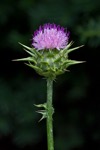| Scientific: | Silybum marianum |
|---|---|
| Other: | Milk Thistle |
| Family: | Asteraceae |
| Synonym: | Carduus marianus |
Milk thistle goes by many names including St. Mary's thistle, blessed thistle, and cardus marianus. To add to the confusion, it has two acceptable latin binomials (Silybum marianum and Carduus marianus). Most herbalists call it milk thistle (Silybum marianum) because of the milky white veins that run through its green leaves.
Although coincidentally milk thistle has documented galactagogue effects, its primary indication is for liver ailments. Most of the medicinal benefits focus on silymarin, which is a mixture of three flavonolignans (silibinin, silychristin, and silydianin). These polyphenols have significant antioxidant and hepatoprotective effects that appear to support various detox pathways in the liver and stimulate liver regeneration to protects the liver from various toxins including alcohol and drugs. Silymarin stabilizes cell membranes, stimulates protein synthesis and accelerates liver regeneration to lower liver enzymes and reduce the progression to cirrhosis. Interestingly, silymarin may help in treating amanita mushroom poisoning, which currently there's no promising antidote. However, clinical trials on the benefits of milk thistle on viral hepatitis remain inconclusive at best.
Silymarin could be an insulin sensitizer, and clinical trials show it improves glycemic control and lipid levels in diabetic patients. Also, people with non-alcohol fatty liver disease (NAFLD), which obesity and diabetes are risk factors, benefit from taking milk thistle extracts. Because of its antioxidant effects, milk thistle may also aid help to prevent atherosclerosis.
One particularly exciting area of research is the inhibitory effect that silymarin has on multi-drug resistant (MDR) pumps that are responsible for certain types of drug resistance. Further research is needed to determine if co-administration of silymarin with some antibiotics and anticancer drugs could increase their efficacy.
Hepatobiliary
• various liver complaints
• jaundice
• viral hepatitis (HBV, HCV)
• drug-induced hepatitis
• non-alcoholic fatty liver disease (NAFLD)
Gastrointestinal
• poor appetite
- poor digestion
- dyspepsia
- hypochlorhydria
• peptic ulcers
• ulcerative colitis
Cardiovascular
• hypercholesterolemia
• atherosclerosis
Metabolic
• type II diabetes
• diabetic nephropathy
• gout
Female reproductive
• agalactia (poor lactation)
Cancer
• chemotherapy - decreases hepatotoxicity and nephrotoxicity
Dermatologic
• acne rosacea
Other
• mercury poisoning
• obsessive-compulsive disorder (OCD )
• Hepatoprotective
• Nephroprotective
• Cardioprotective
• Hepatic
• Bitter (mild)
• Galactagogue
• Antiulcerogenic
• Flavolignans (E.g. Silymarin)
• Phenoilc Acids
• Sterols (E.g. Beta-Sitosterol )
• Tincture (1:5 in 60% EtOH): 2-5 ml tid
• Liquid extract (1:1 in 25% EtOH): 2-6 ml tid
• Decoction (seeds): 1 tsp tid
• Standardized extract (70% silymarin): 600 mg/d
Note: Leaf preparations are devoid of flavolignans, which are found in the seeds.
Generally considered safe when used as indicated.
Contra-Indications:
• gastritis & stomach ulcers
• obstructed gallbladder
Caution:
• Asteraceae allergy: contains sesquiterpene lactones
Pregnancy & Lactaction:
• Considered safe
Milk thistle may affect the drug metabolism by:
• CYP2C9 • may reduce clearance of drugs metabolized by this p450
• Glucuronidation
Milk thistle is known to interact with the following drugs:
• deferiprone
• indinavir
• raloxifene
• simeprevir
Barnes J, Anderson LA, Phillipson JD. Herbal Medicines, 3rd ed. London: Pharmaceutical Press, 2007.
Bone K. Principles and Practice of Phytotherapy. Edinburgh: Churchill Livingstone, 2000.
Bone K. A Clinical Guide to Blending Liquid Herbs: Herbal Formulations for the Individual Patient. St Louis, MO: Churchill Livingstone, 2003.
Brinker F. The Toxicology of Botanical Medicines, 3rd ed. Sandy, Oregon: Eclectic Medical Publications, 2000.
Felter HW, Lloyd JU. King's American Dispensatory. 1898. http://www.ibiblio.org/herbmed/eclectic/kings/main.html. Accessed: August 19, 2006.
Hoffman D. Medical Herbalism. Rochester, Vermont: Healing Arts Press, 2003.
Weiss RF. Herbal Medicine. Beaconsfield, England: Beaconsfield Publishers Ltd, 1988.
Williamson EM, ed. Major Herbs of Ayurveda. Edinburgh: Churchill Livingstone, 2002
Disclaimer: This content is subject to change. The information is intended to inform and educate; it does not replace the medical evaluation, advice, diagnosis or treatment by a healthcare professional. www.nhpassist.com © 2014 NDAssist Inc. and/or its affiliates. All rights reserved.

|
Milk Thistle
SummaryMilk thistle goes by many names including St. Mary's thistle, blessed thistle, and cardus marianus. To add to the confusion, it has two acceptable latin binomials (Silybum marianum and Carduus marianus). Most herbalists call it milk thistle (Silybum marianum) because of the milky white veins that run through its green leaves. IndicationsSign in requiredActionsSign in requiredConstituentsSign in requiredPosologySign in requiredSafetySign in requiredInteractionsSign in requiredReferencesSign in required |
|---|